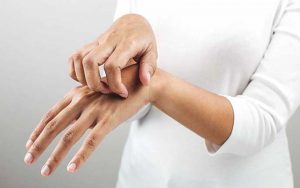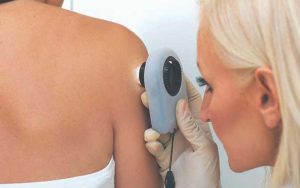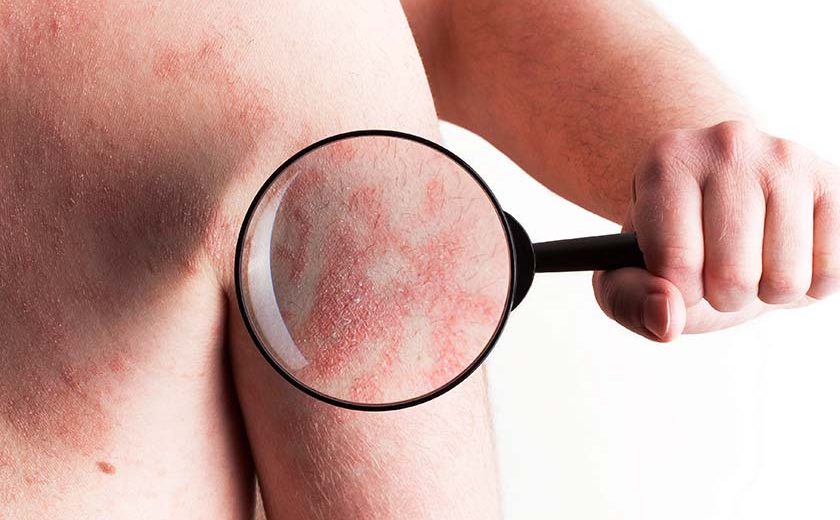Both are chronic skin conditions and both cannot be cured completely, needing treatment and medication throughout the course of one’s life.
To make matters frustrating, both skin conditions often result in scaly, irritated and inflamed red and dry skin. But, both skin conditions are not the same and it is easy to be confused thinking they are. Before we tell you how to tell them apart, we elaborate and discuss a little on psoriasis in conjunction with Psoriasis Awareness Month!
What is it?
Psoriasis [sore-EYE-ah-sis] is a chronic (lifelong) disease related to the immune system. It is not contagious. When you have psoriasis, your overactive immune system sends out signals that cause inflammation in the body and speed up the growth cycle of skin cells. It causes psoriasis lesions, which are abnormal changes to the skin in the form of plaques, pustules or areas of redness and swelling.
Psoriasis is different for each person. It can develop slowly with mild symptoms or quickly with severe symptoms. It can occur on any part of the body.
Fast Facts
- Psoriasis often starts between 15 and 25, but can develop at any age
- It isn’t contagious
- About 1 in 3 people with psoriasis develop psoriatic arthritis, which affects the joints, tendons and ligaments

Symptoms of Psoriasis
The symptoms of psoriasis can be different depending on what type you have. There are 5 main types of psoriasis. Each type has different symptoms and characteristics. People with psoriasis may have more than one type of psoriasis. You can have different types of psoriasis at different times.
Plaque [plak] psoriasis is the most common. It appears as raised patches of inflamed, itchy and painful skin with scales. For some people, the skin may be red with silvery white scales. These plaques most often appear on the scalp, knees, elbows, and in or around the belly button and lower back, but can affect any area of the body.
Inverse psoriasis is the second most common. It appears as inflamed deep-red skin that is smooth and not scaly. Inverse psoriasis affects body folds such as underarms, under breasts, in the genital area and buttocks. It can cause severe itching and pain and can be worsened by sweat and rubbing in these areas.
Guttate [GUH-tate] psoriasis is the third most common. It appears as small, round red spots caused by inflammation that are raised and scaly. Guttate psoriasis often appears on the arms, legs and torso. However, it can affect any area of the body.
Pustular [PUHS-choo-lar] psoriasis is rarer. It appears as pustules (white, pus-filled, painful bumps) that may be surrounded by inflamed or reddened skin. The pustules are filled with pus that is not infectious. This means that they are not caused by an infection and are not contagious. Pustular psoriasis may appear only on certain areas of the body, such as the hands and feet, or may cover most of the body.
Erythrodermic [eh-REETH-ro-der-mik] psoriasis is even rarer. It can cause intense redness and shedding of skin layers in large sheets. It often affects nearly the whole body and can be life-threatening. Other symptoms include severe itching and pain, changes in heart rate and temperature, dehydration and nail changes. If you think you’re having an erythrodermic psoriasis flare-up, you should seek medical attention immediately.

Treatment Options?
This depends on the type of psoriasis you have. Treatments include in the form of oral, topical and phototherapy (light therapy) where healthcare professionals use ultraviolet (UV) light to treat psoriasis.
As there is no proper cure for this chronic skin condition, your health care provider will recommend a treatment plan based on what type of psoriasis you have, the severity of your psoriasis and your reaction to a treatment.
How is Psoriasis different from Eczema?
- Eczema is much more common than psoriasis, and it also has a few different ways of showing up on the skin.
- These two skin problems have different causes and can appear in different stages of your life.
- Psoriasis is immune-mediated, meaning there is some imbalance in the immune system, which leads to inflamed skin while eczema has had its fair share of conversations on whether it is an immune-mediated disease or a skin barrier defect disease
- Psoriasis tends to affect individuals later in life while a textbook case of eczema often occur during early childhood.
Trigger factors
- Eczema is often brought on by things that are irritating to your skin, like detergents or things that cause allergies such as dust and pollen.
- Infections can start up eczema, and so can stress, sweating, heat and humidity, and changes in your hormones.
- Psoriasis shares some of these triggers, like stress and infection. But you can also get flare-ups when your skin is injured, for example by vaccination.
- Some medications can also bring on a psoriasis flare, like lithium, which treats bipolar disorder, or drugs for malaria.
Association with Serious Health Problems
- If you have eczema, you most probably have dry and sensitive skin. You may also have someone in the family who has it, asthma or hay fever.
- But, with psoriasis, it is linked to serious health problems. If you have it, you may also have diabetes, heart disease or depression.
References
Psoriasis.org
WebMD.com
Self.com


